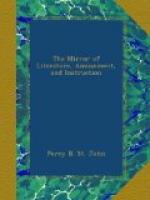In 1726, the masons of Wales attached themselves to the grand lodge of England, and the office of provincial master was instituted soon after. The Society was introduced into India in 1728, and the grand lodge of America constituted, by warrant from London, in 1735; and that of Holland, at Hamburgh, in the same year. In 1738, the Book of Constitutions was published; the grand lodge of Prussia constituted under the Scotch constitution, and has ever since flourished in that country; and in 1774, the grand lodge of Antigua was established, by warrant from the grand lodge of England.
Correspondence was opened with the grand lodge of France in 1768; with that of Holland in 1770; and that of Berlin in 1776. On the 1st of May, 1775, the foundation-stone of the Freemasons’ Hall was laid; and the building was opened and dedicated in solemn form on the 23rd of May, 1776, Lord Petre being then grand master.
In 1779, a correspondence was established with the grand lodge of Germany; and in 1782 an attempt was made to open one with those of Scotland and Ireland. This was not then effected; but in 1803 explanations were made to the grand lodge of Scotland regarding the schism in England; in consequence of which, two years after, the wished for union was accomplished; and in 1808 the same gratifying proposals were made from Ireland, and accepted with cordiality. Meantime, the same brotherly communication had been instituted with Sweden in 1799, and Prussia in 1805.
While these friendly communications with foreign brethren were going on, masonic benevolence, ever privately exercised, had made a public exertion in favour of the children of deceased brethren at home, in the establishment of the charity for female children, in 1788; of the masonic society for the relief of sick, lame, or distressed brethren, and their widows, children, or orphans, in 1799. In the year 1816 freemasonry was revived in Russia, under the patronage of the emperor, and communications forwarded from the grand lodge at St. Petersburgh to that in London.
* * * * *
MANNERS & CUSTOMS OF ALL NATIONS.
WATER AT SHAFTESBURY.
Motcomb, half a mile north from Shaftesbury, is noted for containing the wells from which the inhabitants of Shaftesbury are supplied with water. Great numbers of the inhabitants get their living by carrying water, for which they have three halfpence or twopence the horse load. On this account there is a particular custom yearly observed, according to ancient agreement, dated 1662, between the Lord of the Manor of Gillingham, and the Mayor and Burgesses of Shaftesbury. The Mayor is obliged, the Monday before Holy Thursday, to dress up a prize bezon, or bizant, somewhat like a May garland in form, with gold and peacocks’ feathers, and carry to Enmori Green, half a mile below the town in Motcomb, as an acknowledgment for the




